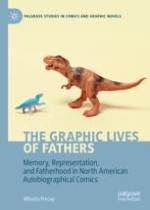This book explores the representation of fatherhood in contemporary North American autobiographical comics that depict paternal conduct from the post-war period up to the present. It offers equal space to autobiographical comics penned by daughters who represent their fathers’ complicated and often disappointing behavior, and to works by male cartoonists who depict and usually celebrate their own experiences as fathers. This book asks questions about how the desire to forgive or be forgiven can compromise the authors’ ethics or dictate style, considers the ownership of life stories whose subjects cannot or do not agree to be represented, and investigates the pervasive and complicated effects of dominant masculinities. By close reading these cartoonists’ complex strategies of (self-)representation, this volume also places photography and archival work alongside the problematic legacy of self-deprecation carried on from underground comics, and shows how the vocabulary of graphic narration can work with other media and at the intersection of various genres and modes to produce a valuable scrutiny of contemporary norms of fatherhood.
